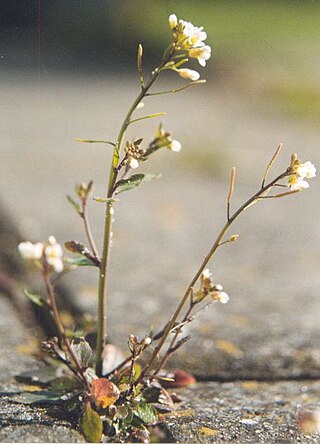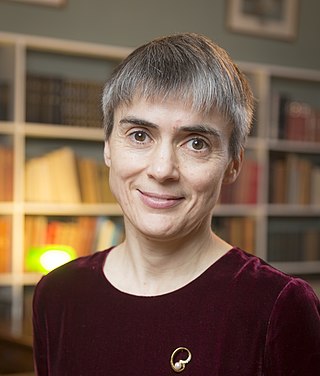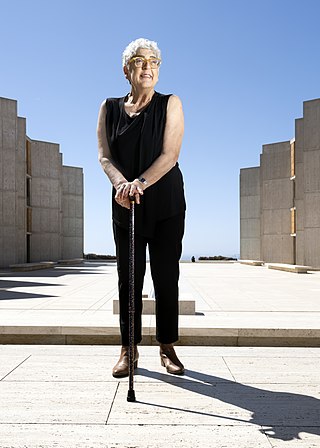
Arabidopsis thaliana, the thale cress, mouse-ear cress or arabidopsis, is a small plant from the mustard family (Brassicaceae), native to Eurasia and Africa. Commonly found along the shoulders of roads and in disturbed land, it is generally considered a weed.
Jonathan Dallas George Jones is a senior scientist at the Sainsbury Laboratory and a professor at the University of East Anglia using molecular and genetic approaches to study disease resistance in plants.

Dame Henrietta Miriam Ottoline Leyser is a British plant biologist and Regius Professor of Botany at the University of Cambridge who is on secondment as CEO of UK Research and Innovation (UKRI). From 2013 to 2020 she was the director of the Sainsbury Laboratory, Cambridge.

Karl Maramorosch was an Austrian-born American virologist, entomologist, and plant pathologist. A centenarian and polyglot, he conducted research on viruses, mycoplasmas, rickettsiae, and other micro-organisms; and their transmission to plants through insect vectors in many parts of the world. He is the co-author of a textbook on techniques in virology and is the author of numerous papers on the biology and ecology of plant viruses, their hosts, and vectors. He received the Wolf Prize in Agriculture in 1980 for his contribution to the study of crop pathogens.
Biotic stress is stress that occurs as a result of damage done to an organism by other living organisms, such as bacteria, viruses, fungi, parasites, beneficial and harmful insects, weeds, and cultivated or native plants. It is different from abiotic stress, which is the negative impact of non-living factors on the organisms such as temperature, sunlight, wind, salinity, flooding and drought. The types of biotic stresses imposed on an organism depend the climate where it lives as well as the species' ability to resist particular stresses. Biotic stress remains a broadly defined term and those who study it face many challenges, such as the greater difficulty in controlling biotic stresses in an experimental context compared to abiotic stress.

Plant disease resistance protects plants from pathogens in two ways: by pre-formed structures and chemicals, and by infection-induced responses of the immune system. Relative to a susceptible plant, disease resistance is the reduction of pathogen growth on or in the plant, while the term disease tolerance describes plants that exhibit little disease damage despite substantial pathogen levels. Disease outcome is determined by the three-way interaction of the pathogen, the plant and the environmental conditions.

Catherine Rosemary Martin is a Professor of Plant Sciences at the University of East Anglia (UEA) and project leader at the John Innes Centre, Norwich, co-ordinating research into the relationship between diet and health and how crops can be fortified to improve diets and address escalating chronic disease globally.

Joanne Chory is an American plant biologist and geneticist. Chory is a professor and director of the Plant Molecular and Cellular Biology Laboratory, at the Salk Institute for Biological Studies and an investigator of the Howard Hughes Medical Institute.

Nicholas José Talbot FRS FRSB is Group Leader and Executive Director at The Sainsbury Laboratory in Norwich.
Jane Glazebrook is an American botanist known for her work on understanding plant defenses against pathogens and increasing crop yields. She received her Ph.D. from the Massachusetts Institute of Technology in 1991 and is now a professor of Plant Biology at the University of Minnesota. She was the editor-in-chief of the journal Molecular Plant-Microbe Interactions. She is married to Fumiaki Katagiri, who also works at the University of Minnesota as a professor of Plant Biology.

Arturo Casadevall is a Bloomberg Distinguished Professor of Molecular Microbiology & Immunology and Infectious Diseases at the Johns Hopkins Bloomberg School of Public Health and Johns Hopkins School of Medicine, and the Alfred and Jill Sommer Professor and Chair of the W. Harry Feinstone Department of Molecular Microbiology and Immunology at the Johns Hopkins Bloomberg School of Public Health. He is an internationally recognized expert in infectious disease research, with a focus on fungal and bacterial pathogenesis and basic immunology of antibody structure-function. He was elected a member of the National Academy of Sciences in 2022.
Jane Elizabeth Parker is a British scientist who researches the immune responses of plants at the Max Planck Institute for Plant Breeding Research.

Ian Alexander Graham is a professor of Biochemical Genetics in the Centre for Novel Agricultural Products (CNAP) at the University of York.
Robert L. Last is a plant biochemical genomicist who studies metabolic processes that protect plants from the environment and produce products important for animal and human nutrition. His research has covered (1) production and breakdown of essential amino acids, (2) the synthesis and protective roles of Vitamin C and Vitamin E (tocopherols) as well as identification of mechanisms that protect photosystem II from damage, and (3) synthesis and biological functions of plant protective specialized metabolites. Four central questions are: (i) how are leaf and seed amino acids levels regulated, (ii.) what mechanisms protect and repair photosystem II from stress-induced damage, (iii.) how do plants produce protective metabolites in their glandular secreting trichomes (iv.) and what are the evolutionary mechanisms that contribute to the tremendous diversity of specialized metabolites that protect plants from insects and pathogens and are used as therapeutic agents.
Alison Gail Smith, Lady Hopper is Professor of Plant Biochemistry in the Department of Plant Sciences at the University of Cambridge, UK. Her research investigates the metabolism of plants, algae and bacteria, in particular vitamin and cofactor biosynthesis.
Girdhar Kumar Pandey is an Indian molecular biologist, biochemist, biotechnologist, and a professor at the department of plant molecular biology of the South Campus of the University of Delhi. He is known for his studies on the signal transduction pathways in Arabidopsis (rockcress) and Oryza sativa (rice) and is an elected fellow of the National Academy of Sciences, India and the National Academy of Agricultural Sciences. The Department of Biotechnology of the Government of India awarded him the National Bioscience Award for Career Development, one of the highest Indian science awards, for his contributions to biosciences, in 2015.
Rachel Leech was Professor of Plant Sciences at the University of York, UK. Her research focused on chloroplasts and she was a leader in the field of understanding their development and function. She was also one of the early adopters of Arabidopsis thaliana as a model plant to identify the genes involved in chloroplast division.
Jen Sheen is a biologist at Massachusetts General Hospital and Harvard Medical School who is known for her work on plant signaling networks. She is an elected member of the American Association for the Advancement of Science.
Christoph Benning is a German–American plant biologist. He is an MSU Foundation Professor and University Distinguished Professor at Michigan State University. Benning's research into lipid metabolism in plants, algae and photosynthetic bacteria, led him to be named Editor-in-Chief of The Plant Journal in October 2008.
John M. McDowell is the J.B. Stroobants Professor of Biotechnology at Virginia Polytechnic Institute and State University. His major area of research is phytopathology and plant-pathogen interactions. He has used gene-sequencing technology to examine the genome of Phytophthora capsici and to develop strains of soybean plants that are better able to defend against pathogens.








